1st Year
MONTH
10
1st Year – Month 10
Do Yourself a Favor
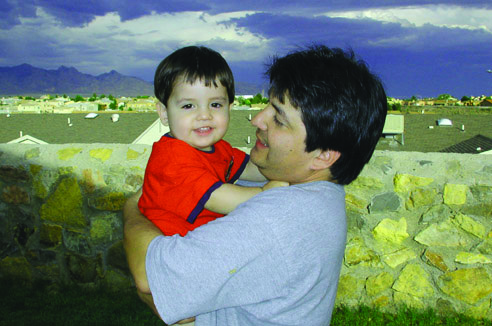
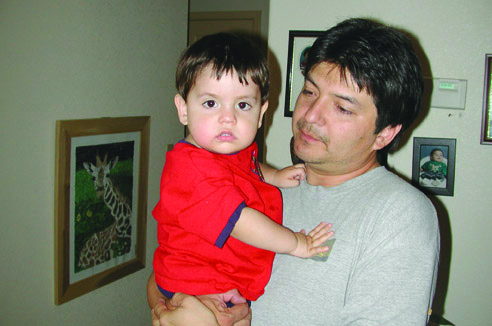
Whenever you find yourself overly stressed, think about giving yourself a gift – time just for you. If you’re a single parent, you can trade babysitting with another parent or trade a service, such as cooking a meal in return for a few hours to yourself.
Taking time for yourself will help you feel refreshed and ready to get back to parenting. There’s an added bonus for your baby. You will be better at solving problems and finding different ways to get things done. When you take care of yourself, you are helping everyone in your family.
Here are some ideas for investing in you:
- Take a long bubble bath, a walk, a swim, or a catnap. Watch a movie or read a book.
- Plan your future. Investigate classes you might take or jobs you might apply for, or plan other activities you would enjoy.
- Spend time with a friend.
- Talk to someone about the stress you feel and what you might do to reduce it.
What’s It Like to Be 10 Months Old?
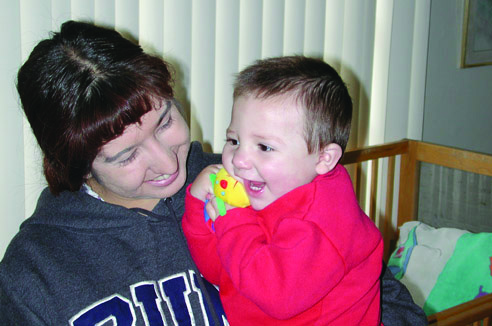
How I Grow and Talk
- I crawl up steps, but I haven’t learned how to get back down yet.
- I walk if you hold my hands, or I can hold on to furniture.
- I sit down from a standing position.
- I climb up on to chairs and then climb down again.
- I feed myself with my fingers, and I help hold my cup.
- I carry things in one hand without dropping them.
- I may have trouble sleeping at night because I’m restless.
- I may understand simple sentences.
- I can say no and shake my head from side to side.
- I am interested in conversations when I hear familiar words.
- I know a few words besides ma-ma and da-da.
- I may really test your patience when I repeat the same words all day long. Or, I may say no words at all.
How I Respond
- I know when you approve or disapprove of what I do.
- I cry if another child gets more attention than I do.
- I still don’t like being away from you.
- I like to imitate people, gestures, and sounds.
How I Understand and Feel
- I have many different feelings now —sad, happy, mad, and scared.
- I can be very moody, and I get upset easily.
- I may still feel shy around people.
- I am sensitive to other children’s moods.
- I know which toys belong to me, and I have some favorites.
- I will look for something—if I see you hide it.
- I know that if I don’t see a toy, that doesn’t mean it’s gone forever.
- If my toys are out of reach, I get them myself and play with them.
- I am beginning to know that I am a boy or a girl.
Some children do things earlier or later than described here. Most differences are normal. Focus on what your child can do and get excited about each new skill. If you notice that your child is lagging behind in one or more areas for several months, use this list to talk with your doctor about your child’s development.
Feeding Your Baby

While you are feeding your baby, your baby may be feeding the floor. Most babies don’t learn how to use a spoon well until after their first birthday. If your baby is interested, now is a good time to begin letting them practice using a spoon.
Here are some foods that will stick to the spoon when scooped up:
- Yogurt
- Applesauce
- Cooked cereal (oatmeal, cream of rice, or cream of wheat)
- Cottage cheese
- Macaroni and cheese
- Mashed cooked beans
- Mashed sweet potatoes
- Pureed or mashed vegetables and fruits
- Pureed or mashed cooked chicken
 Include finger foods with your baby’s meals. Although your baby may not be good at using a spoon yet, they like to feed themself. Having some finger foods at mealtime gives your baby some easy foods to eat
Include finger foods with your baby’s meals. Although your baby may not be good at using a spoon yet, they like to feed themself. Having some finger foods at mealtime gives your baby some easy foods to eat
Good finger foods are:
- Unsweetened round cereal and cereal puffs
- Cooked (never raw) vegetable strips or pieces (carrot, green beans, and potato)
- Peeled, soft fruit wedges or small pieces (peach, pear, melon)
- Small, tender pieces of cooked and ground or shredded meat
Some Babies Like Field Trips
Does your baby like to shop? Some children really seem to enjoy the shopping experience. Others get overly excited by all the colors, textures, smells, and noises and may “freak out” with bad behavior. If your child can handle the stimulation, shopping can be a fun outing.
Plan before you go. Plan to go at a time when your baby is not hungry or tired. You might want to bring something from home for them to play with and keep those busy hands from grabbing something unsafe at the store.
Don’t let them stand in the grocery cart. Use the seat strap, or bring one to keep them seated.
You can help your baby learn in the store by talking to them and pointing out the different items. When you choose some apples you can say, “We need four red apples. See, one, two, three, four.”
Climbing is an Important Skill
 Show your baby how to climb up and down, on and off safe objects. This makes learning to climb safer. When you have time to help your baby with their climbing exercises, show them how to climb up. Show them how to come down crawling backward, so they don’t do it head first. Gates at the top or bottom of the stairs, depending on where the baby is, can prevent accidents. Don’t use an accordion style gate or a gate with a V-shaped opening. These have caused accidents and deaths. Buy a gate approved by the Consumer Product Safety Commission.
Show your baby how to climb up and down, on and off safe objects. This makes learning to climb safer. When you have time to help your baby with their climbing exercises, show them how to climb up. Show them how to come down crawling backward, so they don’t do it head first. Gates at the top or bottom of the stairs, depending on where the baby is, can prevent accidents. Don’t use an accordion style gate or a gate with a V-shaped opening. These have caused accidents and deaths. Buy a gate approved by the Consumer Product Safety Commission.
Dealing with Anger and Temper Tantrums
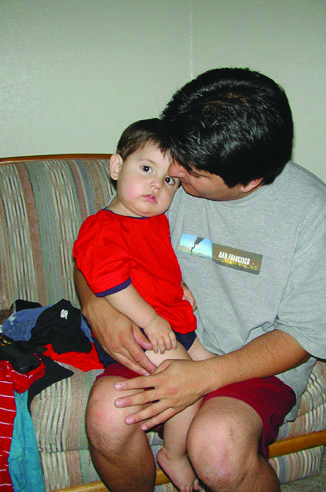 You may have seen your baby act angry. Understanding angry behavior can help you handle these difficult situations.
You may have seen your baby act angry. Understanding angry behavior can help you handle these difficult situations.
The anger might start when your baby wants something they can’t have or when something is taken away from them. They look angry, and their body is heavy and tight. They focus on what they want and won’t be distracted. They may kick and scream. They are having a temper tantrum. They are being controlled by their anger. Now, you have to help them learn to control their anger.
Yelling and punishing them are not helpful. Actually, they make things worse. They are out of control. So you have to be in control.
Think about when and where your baby gets angry.
Are they hungry or tired? If so, either feed them or change the schedule. If it happens in a particular place or situation, see what you can change to prevent your baby from becoming angry.
If your baby is frustrated because they don’t know how to do something, show them how. For example, if they can’t crawl back down the stairs, show them how to crawl backward.
If your baby is frustrated because you have set limits (such as no cookies), try to interest them in a different activity or object. If this doesn’t work, pretend to ignore them as you straighten the room or wash the dishes. Stay nearby and be patient. When they see that you are not paying attention, they will quiet down.
Once your baby is calm, give them a hug and a little understanding. Their strong emotions are no fun for you, but they are scary for them, too.
What if your baby gets upset in a public place, such as the grocery store? Once again, try to interest them in something else, such as a toy or a picture on a cereal box. If they continues to be frustrated, you may have to pick them up and leave the store.
Your child is not the first to scream or cry in public. Even the people who frown or make comments have probably gone through the same thing themselves. Ignore them.
Don’t spank your baby. This does not help. They are already out of control. It scares them even more when you are out of control and angry.
This is just the beginning of helping your child deal with anger. Creating good habits to handle anger now will pay off later.
Time to Teach the “Ahhh” Game

A smart thing to teach your child is to open their mouth, stick out their tongue, and say, “Ahhh.” This trick will make going to the doctor easier. It is also helpful when you want to see what your baby has put in their mouth.
To teach your baby to say, “Ahhh,” open your mouth wide and stick out your tongue. Your child will learn by copying you.
No matter how safe you try to make your home for your baby, they will find something to put in their mouth. When this happens, don’t panic! You might startle your child and cause them to swallow the object. Instead, act as if you are playing the “Ahhh” game. If your baby knows the game, they will copy you. You can check your child’s mouth in no time.
Has Your Baby Started Teasing You on Purpose?
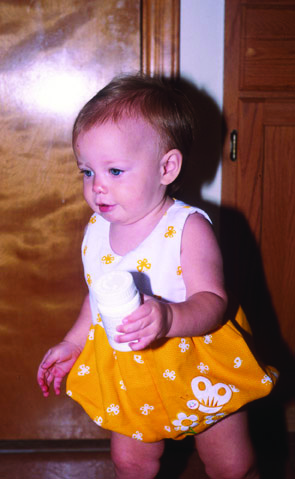 Has your baby ever headed straight for a wastebasket, making sure you notice? Do they reach for your glasses, waiting to hear you say no? Your child is testing the limits. They are experimenting to see just where the limits are. Teaching children to behave has always been a challenge. What works best is to make it easy for them to do the right thing. That works better than trying to keep your baby from doing the wrong thing. Make sure your baby gets plenty of your attention when they are doing things right, not just when they are doing things wrong. They love your attention and will do anything to get it.
Has your baby ever headed straight for a wastebasket, making sure you notice? Do they reach for your glasses, waiting to hear you say no? Your child is testing the limits. They are experimenting to see just where the limits are. Teaching children to behave has always been a challenge. What works best is to make it easy for them to do the right thing. That works better than trying to keep your baby from doing the wrong thing. Make sure your baby gets plenty of your attention when they are doing things right, not just when they are doing things wrong. They love your attention and will do anything to get it.
Give your baby safe toys and places to play. Pick up your baby and take them away from dangerous things. Be a teacher. Use words such as “hot,” “tastes bad,” and “stop” instead of saying “no” all of the time.
Question And Answer: Explorers Are Learning
Question:
My child crawls around and pulls everything out of drawers and cupboards. I want to let them explore, but will this become a bad habit if I don’t do something?
Answer:
Don’t worry about your baby developing bad habits yet. Babies this age create clutter. Healthy 10-month-olds are explorers. Your baby pulls things out of drawers, turns furniture over, drags toys all over the house, and examines everything they can touch. They are trying to figure out how everything works. Make the most of this fun stage. Drawer and cupboard latches will keep them out of things they shouldn’t have. Make special drawers or shelves just for your baby. Fill them with plastic bowls, wooden spoons, special toys, or surprises that will keep them interested in staying in one place. You are right to let them explore. Now, you just have to guide them to explore the places you have set aside for them. Studies show that mothers, whose children do well in school, talk to their babies. They encourage their children to explore. They are relaxed about housekeeping and spend time enjoying their children. They also enforce the few rules they set. What you do now will pay off in the future.
My Baby Called the Teacher Mama
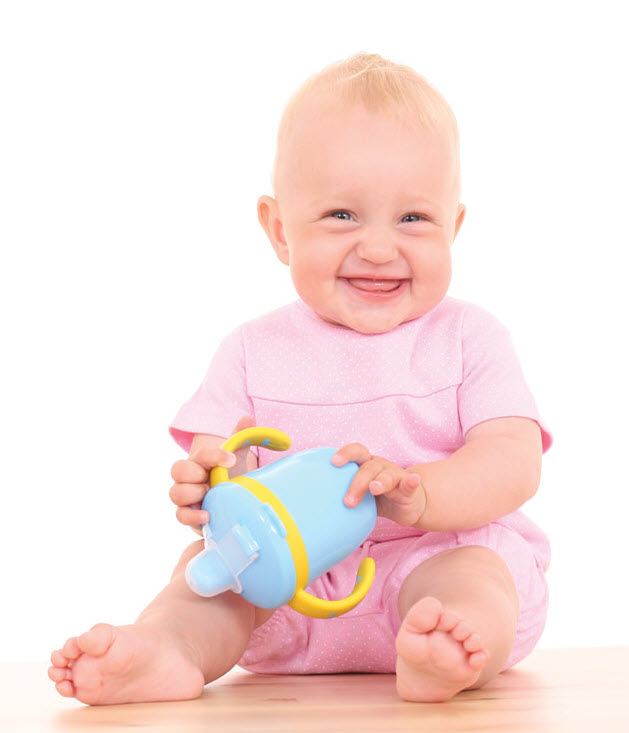
Parents who use full-time child care sometimes worry that their babies will feel more love for the child care provider than they feel for their parents. When your baby calls another woman “Mama” you may feel hurt, jealous, guilty, or confused. Research shows that infants in child care do form strong bonds of love with caregivers. Your baby sees the caregiver as someone to calm their fears and help them feel secure. Studies show that caregivers do not replace parents. Some of the research was done in communal towns in Israel, where babies live and sleep in special infant houses with trained caregivers and only see their parents for about three hours every evening. Even in this extreme case, babies are more strongly attached to their parents than their caregivers.
Babies form these same strong attachments to adoptive parents, too. The research is clear: Your child care provider doesn’t compete with you. They help you raise your baby, but never replace you. Having a strong attachment to the child care provider is good. Your baby feels secure and loved in every place they spend time, both at home and in child care.
If your baby calls the child care teacher “Mama” by mistake, you can tell yourself, “How nice! My baby feels safe and loved by their teacher.” You’ll also know that no one can replace you.
Play with Me: It Helps Me Learn
Which Hand Is It In? A “Things-Don’t-Disappear” Game
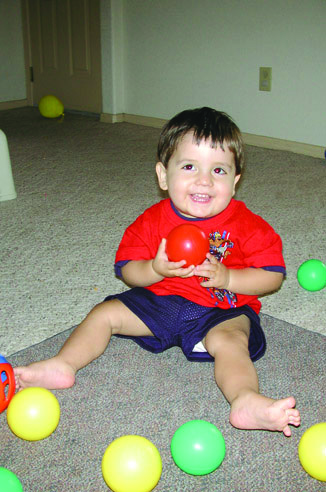 Purpose of the game: To teach babies that things are still there, even when you can’t see them, and how to get information from words.
Purpose of the game: To teach babies that things are still there, even when you can’t see them, and how to get information from words.
How to play: Hold a small object in one of your hands and show your baby the object.
Switch the object back and forth slowly between your hands several times.
Keep your hands closed. Show both hands to your baby and say, “Which hand is it in?”
When your baby reaches for one of your hands, say either, “No, it’s not in this hand.” (Quickly open your hand.) “This hand is empty. Where is it?” or, “Yes, it’s in this hand.” (Quickly open the other hand.)
Other “Things-Don’t-Disappear” Games
Hide a toy under a towel. Encourage your baby to hunt for the toy.
Hide a book under a box. Ask, “Where is the book?”
Remember, the goal of these games is not to fool your baby but to help them learn that objects are there even when they can’t see them.
Question And Answer: How Much Time Is Enough?
Question:
Sometimes I feel guilty. Am I a lousy parent because I have to be away at work all day?
Answer:
Of course not. But it is hard to be both a good parent and a good worker. If you find quality child care for your baby and if you do your best to be a sensitive parent, your baby will usually do fine. The research shows that what you do with your baby when you are together is more important than the number of hours you work outside the home. For example, babies usually form their first strong attachments to fathers and mothers during the same period (about 6 to 8 months of age), even when one parent works full time and the other is home with the baby. From your baby’s point of view, the important thing is to have quality care all day long, whether at home or elsewhere, or with a parent or a child care provider.
Happy Meals
Food habits you build today will last a lifetime. Meal times matter!
Hungry babies want to eat. It’s up to parents and other caretakers to help babies develop a good attitude about food.
How? With lots of praise, a little patience, and encouragement, your baby can learn to like a wide variety of tastes and textures in new foods.
Good food habits start in infancy. Help your baby learn to eat just the right amount for them — not too much, not too little, but just the right amount. Don’t make your baby clean their plate. Don’t offer food as a reward.
If your baby doesn’t like a food, don’t make them eat it. Wait a week or two, and then offer it again. Give a small portion of what they didn’t like before, served with a food they do like. Do not mix the two.
You might try to cook the food they dislike in a different way. Young children may not like a food they can’t identify. If the rest of the family likes a food, your baby will probably like it, too.
When family members or friends offer your baby foods that you prefer not to serve, be willing to bend a little bit. Allow your child to have a small amount of the food every now and then. Small amounts of sweets will do less harm than a negative response from you. On the other hand, encourage your child to eat healthy foods every time you get a chance.
Reminders
Subscribe: If you are not already a subscriber, you can receive the newsletters direct to your email on your child’s birthday. Register at JITP.info (English) or (Spanish).
Every baby is unique: When reading this newsletter, remember: Every baby is different. Babies may do things earlier or later than described here.
Updates: We are constantly reviewing and updating JITP.info. See our current plans on the About Us page. Do you have questions or corrections? Email us at contact@jitp.info.
Credits: This newsletter was reviewed and updated in 2020 by YaeBin Kim and Dan Weigel (University of Nevada-Reno) and Anne Clarkson (Wisconsin-Madison Extension).